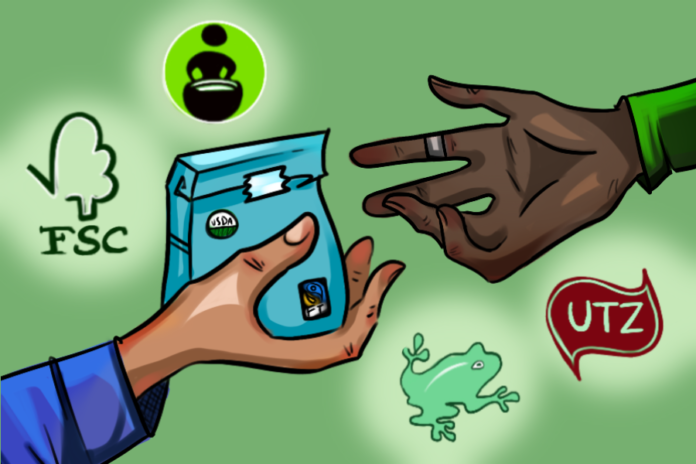Buying certified specialty coffee has a positive impact on local growers
By MAYA KORNYEYEVA — mkornyeyeva@ucdavis.edu
Ah, caffeine. The chemical substance many of us college students depend on to get through lectures and focus on homework (I write this while sipping on an “Ecstatic” iced coffee from Philz). The most beloved and common form of caffeine is found in coffee, bought at a local cafe or taken from our UC Davis Dining Commons.
However, a lot goes into creating this dark, rich drink. Coffee is one of the top exports for many countries in Latin America, Africa and East Asia. Thousands of smallholder farmers depend on the production of coffee beans for their incomes, and things haven’t been looking great for nearly half a century; in part due to the way coffee exports have been set up by the International Coffee Agreement (ICA).
The infamous ICA, negotiated in 1962 by 54 countries, created a quota system for each country’s coffee exports in an effort to set equitable prices for farmers. This system worked for almost 30 years until 1989 when the growing shifts in coffee consumption destabilized the agreement and sent prices into a downward spiral.
This disproportionately affected coffee farmers, lowering the global market price per pound and causing many producers to cut their living expenses in order to survive. The changing market also fostered a trend of disequilibrium, giving more power and money to international trading-and-buying companies and taking away profit from export countries.
Naturally, governments and local groups scrambled to remedy this. In the time since, coffee prices have slowly inched back up due to several big reforms created to help origin countries. I believe one of the most important developments was the introduction of specialty coffee certifications like Fair Trade, Rainforest Alliance, Organic, UTZ Certified, Nespresso AAA Sustainable Quality and Starbucks C.A.F.E practices.
These labels were a direct response to the coffee crisis, and place a “premium” on coffee price or quality to generate extra revenue for farmers whose product meets certain criteria. The standards set by companies like Fair Trade (1997) help incentivize smallholder cooperatives to improve coffee yield and quality and are one of the fundamental reasons why coffee is regarded as a pioneering industry for sustainability regulations and certification.
As Fair Trade flourished, other organizations were battling on different fronts. For instance, the Rainforest Alliance (1987) was leading a mission to conserve biodiversity and ensure sustainable livelihoods and practices, while UTZ Certified (2002) was working towards improving market transparency by giving farmers access to market information, strategy and pricing.
When buying coffee or any other product, I’ve noticed that consumers rarely inquire about the source, with the most attention being a glance to check if the item is certified “organic,” followed by a sigh as they grudgingly dish out a few extra dollars at the register. But there is a reason for the fact that a majority of organic and fair trade coffee is a bit more pricey: not only is it higher quality, but the price boost ensures that coffee farmers are actually profiting from the sale and making enough to support themselves. Approximately 50% of coffee farmers live below the poverty line. Taking that extra time to glance over the labels and certifications can ensure that you aren’t supporting a brand that actively exploits farmers and instead that you are contributing to the furthering of sustainability and environmental practices.
Like switching from plastic products to reusable materials, coffee is a case study of how agricultural practices and commodity markets can be altered by consumer preferences. A small shift in mindset could mean more power to local growers and even greater access to technology and education, boosting the coffee sector to a greater level of inclusion and equitability. So the next time you’re at the supermarket looking for your coffee fix, make sure you check the label.
Written by: Maya Kornyeyeva — mkornyeyeva@ucdavis.edu
Disclaimer: The views and opinions expressed by individual columnists belong to the columnists alone and do not necessarily indicate the views and opinions held by The California Aggie.










